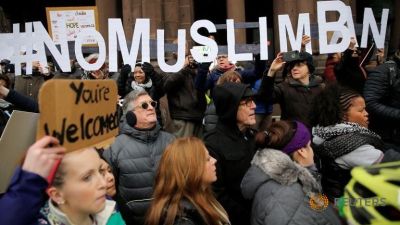5 False Claims About Trump's Refugee Ban
Trump's Executive Order is a 'Muslim ban'

One of the most widely made claims by opponents of Trump's travel order is that it's a de-facto "Muslim ban."
The term was used so much that the hashtag #MuslimBan was the No. 1 trend worldwide on Twitter Jan. 28–29.
Additionally, news organizations often use the term "Muslim ban" in their headlines of stories focusing on the order.
Although most critics rely on the fact that the order suspends travel from seven Muslim-majority countries — Iraq, Iran, Syria, Somalia, Sudan, Libya and Yemen — to claim that it is a Muslim ban, it should be noted that the actual language of the executive order does not include any mention of specific religions.
Critics who make the Muslim ban claim often rely on that fact that Trump made the bold promise during his campaign to ban Muslim immigration. However, the language of the order says nothing about Muslims or Islam.
Even though it has been called a Muslim ban, residents of those seven countries who are non-Muslims are also prevented from entering the U.S. until the end of the 90 days. That means that Iranian and Sudanese Christians are out of luck while Muslim visa travelers from Nigeria are able to enter the U.S.
"[Trump's order] is not, in any way, a 'Muslim ban.' It is a temporary restriction on incoming immigrants from certain high risk countries that have proven they, themselves are, or are willing to harbor groups that, are a known threat to the safety of the people of the United States. These are nations that are openly hostile — by their governments, by their people, or both — to America and its interests," foreign policy analyst and lawyer Slater Bakhtavar wrote in an op-ed for the conservative news outlet The Daily Caller.
"The fact that their people tend to be Muslims is entirely irrelevant. If terrorists with a thirst for American blood overwhelmingly originated from countries with majority Christian, Jewish, or Buddhist populations, [then] one wonders whether the media and other leftist organizations would feel that those religions were being targeted by this order."




























